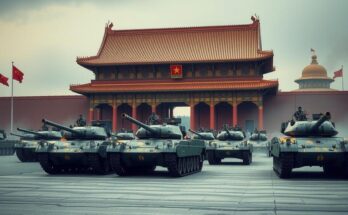The United States is increasing efforts to transform the Kenya-led force in Haiti into a U.N. peacekeeping mission due to rising gang violence affecting Port-au-Prince. Political instability heightened gang attacks, leading to further violence and air traffic disruptions. The U.S. seeks consensus among Security Council members for a draft resolution to initiate this transformation while addressing the financial challenges of securing necessary funding. This situation underscores the historical complexities and risks associated with foreign intervention in Haiti.
The United States is intensifying its efforts to convert the Kenya-led multinational force in Haiti into a United Nations (U.N.) peacekeeping force amid rising gang violence that has disrupted air traffic to Port-au-Prince. Following its initial proposal for a U.N. peacekeeping mission in September to secure necessary funding for the struggling force, the U.S. faces significant challenges as gang violence escalates after a recent political upheaval in Haiti. The gang-related intensification of violence led to an attack on the capital’s main airport, resulting in injuries and further unrest. The U.S. has sought consensus among Security Council members on a draft resolution aimed at initiating the transformation of the Kenyan-led force into a more structured U.N. mission, a process that may be lengthy and complex. Despite United States efforts to finalize the resolution, nations such as Russia and China expressed concerns and called for further discussions on Haiti’s circumstances before proceeding. There are currently about 430 police deployed instead of the proposed 2,500 force, with pledges of additional troops from Kenya forthcoming. The U.N. trust fund supporting this initiative remains significantly underfunded, with approximately $85.3 million received out of the pledged $96.8 million, underscoring ongoing financial difficulties. Since the assassination of President Jovenel Moïse in 2021, gang influence has increased dramatically, prompting civil unrest and demands for U.N. support. The situation highlights the complexities and potential risks associated with foreign military interventions in Haiti, as previous U.N. missions have faced criticism due to allegations of misconduct and negative impacts on public health. With the support from Haitian leaders for a U.N. peacekeeping force, the international community is at a crossroads, weighing the merits of intervention amid a backdrop of historical challenges.
The escalating gang violence in Haiti has prompted international intervention discussions. Following the 2021 assassination of President Jovenel Moïse, gangs rapidly expanded their control over various regions. The political instability has driven the need for international assistance, particularly from the United Nations. The U.S. has taken a proactive role to establish a U.N. peacekeeping force to stabilize the region, addressing both security concerns and funding challenges faced by the current Kenya-led force. This situation highlights the history of foreign military interventions in Haiti and the mixed responses they have elicited from the populace, pointing to the sensitive nature of peacekeeping in the nation.
In summary, the United States’ initiative to transition the Kenya-led force in Haiti to a U.N. peacekeeping operation arises from a backdrop of escalating gang violence and political turmoil. Despite budgetary concerns and lukewarm responses from key international players, the U.S. remains committed to facilitating international support for Haiti’s recovery efforts. The complexities of historical interventions pose potential risks to efficacy, necessitating careful consideration of strategies moving forward. As the situation develops, the role of the international community will be pivotal in shaping Haiti’s near future.
Original Source: apnews.com




